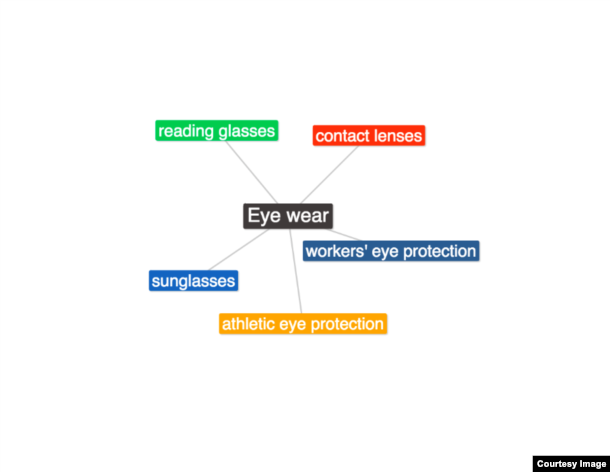English learners can improve their ability to remember words by making connections to what they already know.
That idea comes Sarah Lynn, an educational consultant and teacher at the Harvard University Bridge Program.
She says that she wants to help learners to take control of their learning. Learning begins with the learner, she adds, not with the teacher.
Learning new material is difficult
If you are like many language learners, you have probably had an experience like this one:
Person 1: How was school yesterday?
Person 2: My teacher… uh…
I can't remember the word. You know, my teacher … uh … my homework.
Person 1: Oh! Your teacher returned your homework!
Person 2: Yes, my teacher returned my homework!
This conversation shows a common problem that all language learners face: remembering vocabulary words.
Part of the reason that remembering new words is difficult is because the learning process takes effort.
This process takes effort because you are growing new connections in your brain when you learn new information, says Sarah Lynn.
Scientists who study the brain call these connections dendrites. They say that dendrite connections grow thicker and stronger with practice.
This mental strengthening process is why some teachers, such as Sal Khan of Khan Academy, say that training your brain is like training your muscles: you put your brain under stress and it adapts over time.
Lynn suggests that making strong connections in the brain is important for retrieval– the ability to remember words.
What can you do?
So, if learning takes effort, and it requires people to develop connections in their brains, what can you do to improve your ability to remember words?
Lynn had several recommendations, which we will explore in future Education stories. Her first recommendation is this: make connections when you first learn a word.
Our minds, she says, carry a large amount of information. By linking new information to background knowledge, you may be able to remember new information better.
Sarah Lynn is not the only person who recommends that English learners make connections.
Experts who study learning strategies -- the thoughts and actions that can help people learn better -- also recommend making connections.
One learning strategy approach, the Cognitive Academic Language Learning Approach (CALLA), calls this "Using Background Knowledge."
CALLA founder Anna Uhl Chamot says that learners should think about and use what they already know to help them do a task. They can also use new information to clarify or modify what they know already.
English learners can use this idea to improve their ability to remember new words, Lynn says.
A learner who wants to learn a new word, such as sunglasses, for example, can use many strategies to connect background knowledge to new information.

You probably know what sunglasses look like, even if you do not know the word in English. You probably know which sunglasses you like. You probably also have an idea about what sunglasses looked like in the past.
All of this information is old information – in other words, the background knowledge you have about sunglasses.
English learners can use background knowledge and make connections among different ideas to improve their ability to remember words.
Lynn explains:
“Well, what does 'sunglasses' mean? Oh! Glasses for sun. How interesting... To think about the word is useful. To hold something that means the word is useful. To draw a picture of the word is useful. To think about the sunglasses you want is useful. To think about how sunglasses have changed over time. All of these things are part of remembering the word 'sunglasses.’"
The important point, Lynn says, is that English learners should not just translate new words from English into their native language.
Instead, by really thinking about what the word means, by drawing connections between new words and ideas, you can make your learning more durable, adds Lynn.
Durable learning is what you want when you study a language.
So, the next time you learn a new word, try making connections. As Lynn suggests, if you are learning the name of an object, pick it up and examine it. Draw a picture of it. Imagine different kinds of the object. Consider its history. Ask how the object relates to your life. Or think of an image that relates to the word.
You can draw a semantic map to remember how you connected the new and old information. Or you can even use free software that draws a semantic map for you.

You might spend more time studying, but the investment should help you remember new words better.
Try it, and let us know how it works for you!
I'm John Russell.
John Russell wrote this story for Learning English. Kelly Jean Kelly was the editor.
English learners interested in using semantic maps can use this tool: https://www.text2mindmap.com/
How do you make connections to new information? Write to us in the Comments Section.
________________________________________________________
Words in This Story
consultant – n. a person who gives professional advice or services to companies for a fee
dendrite – n. a short branched extension of a nerve cell, along which impulses received from other cells at synapses are transmitted to the cell body
muscle – n. a body tissue that can contract and produce movement
adapt – v. to change your behavior so that it is easier to live in a particular place or situation
retrieval – n. the act or process of getting and bringing back something
background – n. the experiences, knowledge, education, etc., in a person's past
durable – adj. staying strong and in good condition over a long period of time





































